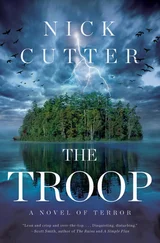“Jesus. How?”
“He just never came back out,” said Al. “I waited and waited, but when he didn’t show up they told me to resurface. I couldn’t get inside, anyway. But surface diagnostics indicated the station was safe to enter, meaning Otto had completed his task. When the electrical team came down, they found him curled up in the animal quarantine. Dead. Embolism. He just finished his job, then laid down in the dark and died.”
The only one who died , Luke thought, except for Westlake.
“It’s all self-contained,” Al said. “Electricity, air, waste removal. Food and water are brought down as needed. A perfect little microsystem that thumbs its nose at the laws of physics.”
Luke barely heard her. He was still dwelling on Otto Railsback, who’d crawled diligently through the tunnels with his foam gun until he reached his own end.
THERE IS A SPECIFIC DEPTHyou’ll hit where the soul finds it impossible to harmonize with its surroundings.
It’s not the darkness. A man is acquainted with it by then—as acquainted as he can ever be. It’s not the vast silence or the emptiness or the absence of any life-forms he can draw warmth or certainty from.
It’s not the pressure. It’s not even the fear of death that constantly nibbles at the edge of his mind.
It’s the sense of unreality. This out-of-body feeling that you’ve stepped away from the path your species has always tread. Things become dreamlike, inessential. Your mind, seeking solace in the familiar, retreats to those things you understand, but those things become so much harder to grasp.
Memories degrade. You remember parts of people, but you surrender their wholes. Abby could crack an egg with one hand. It was a quirky skill Luke remembered wishing he had. He could still recall the sight of her doing it and the yearning that he could do it, too. But the more essential parts of her were already failing him.
The water wasn’t the same down here.
Water is what runs out of our kitchen taps or a playground drinking fountain. It fills bathtubs and pools and yes, of course, the ocean—but at a certain depth, water becomes a barrier from all you remember, all you think you know.
You’re trapped within it, a plaything of it.
Focus erodes. Your thoughts mutate. The pressure.
The pressure.
The soul can’t cope with that. It shouldn’t be expected to.
Humans weren’t built for this. There’s a reason nothing lives down here.
Or nothing should.
LUKE WAS UNAWAREof the exact point when it began to snow.
Marine snow, according to Al. The detritus of animal and plant life that had died miles above. It fell steadily through each zone of the ocean, down and down, shredding into flakes, leached of pigment until it became bone white. A snow of death.
It fell without cease, each “flake” composed of lace-edged rags of flesh and bone and gut. Looking at it, Luke thought back to that first night with Abby—the snow falling from a coal-dark Iowa sky. He tried to isolate the details of Abby’s face but they slithered through his mind, eelish and ungrippable.
Al toggled the joystick, angling the Challenger slightly downward.
“We’re here,” she said quietly.
Luke squinted through the porthole. Darkness thick as grave dirt. Then, permeating that darkness, the tiniest speck of light.
This speck attached to another speck, and another. From these specks, a rough shape resolved and the Trieste came into view. Luke sat by the window, jaw open, staring.
It was repulsive.
The blood backflowed in his veins, the strangest sensation—like a clock running backward against its mechanics, stripping gears and snapping springs.
We need to ascend now, he thought wildly. Seek the sunlight , fast, and never come back.

LUKE COULD ONLY GLIMPSEthe Trieste in sections. Whenever Al swung the Challenger around, illuminating a section he’d already seen, it looked different to Luke—as if it had shifted subtly, somehow reconfiguring its arrangement.
Luke’s mind continued to fight the reaction of his initial horror. It was nothing but steel and foam and space-age polymers. A marvel of engineering. It of course had no mind, no will. And still…
It was awful. He couldn’t isolate what repelled the eye, the revulsion that squatted so leadenly in the lizard brain. It was snakelike, for one—of course it was: the Trieste was all tubes. They spooled along the ocean floor, which was clad in a powdery drift of marine snow. The tubes were oddly segmented, branching off at unnatural angles, as to appear vaguely arachnid: long dark legs extending from a central hub.
There was a manic union between its various parts; it shouldn’t cohere as a structure. Its angles were bizarre and somehow despairing. Some tubes appeared to end abruptly… that, or they burrowed into the sea floor like an enormous worm.
Maybe the pressure exerted the same warping effect it had on Challenger 4, bending each angle slightly out-of-true—which, cumulatively, made the Trieste look disgustingly alien. Or maybe it was the fact that the bulk of it hadn’t been assembled by human hands: robots had no sense of beauty or symmetry; they simply slotted link A to coupler B. The structure throbbed with a numbing hunger—but for what ? Luke was overcome with a sinister shrinking sensation, as if his soul had dwindled to a pinprick and the Trieste had swarmed in to fill that space, reducing him under its brooding, inanimate power. Luke couldn’t shake the ludicrous sense that the Trieste had built itself to serve a purpose known only within itself. It seemed sentient, watching like a snake coiled in placid contentment under warm desert rocks. Knowing, in the seething core of itself, that it need only to wait.
“It’s got a certain look to it,” Al said.
“You’ve been inside?”
“A few times. Not for long, and only to drop off supplies. To speak the truth, none of us like spending all that much time down here. Docking’s the trickiest part.”
She edged them toward the Trieste . The Challenger swayed under the enormous pressure of water, which no longer shushed and gurgled against its hull but instead pushed back with leaden insistence as if they were moving through hardening concrete.
As they approached, Luke saw what had made those initial pinpricks of light: windows, same as the porthole on the submarine, dotted the length of one tube. Weak fingers of light spilled from each.
One of Al’s navigational tools pinged as she zeroed in.
Five feet, four, three, two…
Al guided the sub to the porthole and cut the engines. The Challenger met the Trieste with the sound of a locket snapping shut.
Other sounds: whirrings, clickings. A pneumatic whine—the noise you’d hear in a mechanic’s shop when they’re tightening the lug nuts on your all-seasons.
“It should be sealed now.”
Luke said, “And if it’s not?”
Al gave him a grim smile. “We won’t feel a thing.” She unsnapped her belt. “You’re going to have to step through first.”
“Me? Why?”
The flesh tightened around Al’s eyes. For the first time, she got that mildly irritated look a person gets when they’re dealing with a newbie.
Читать дальше













